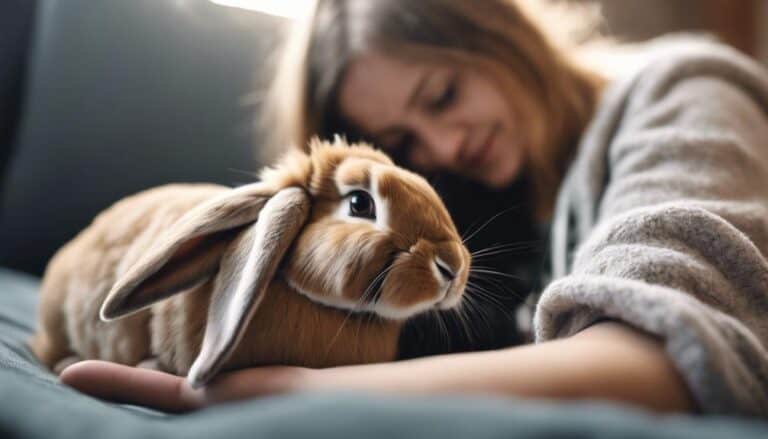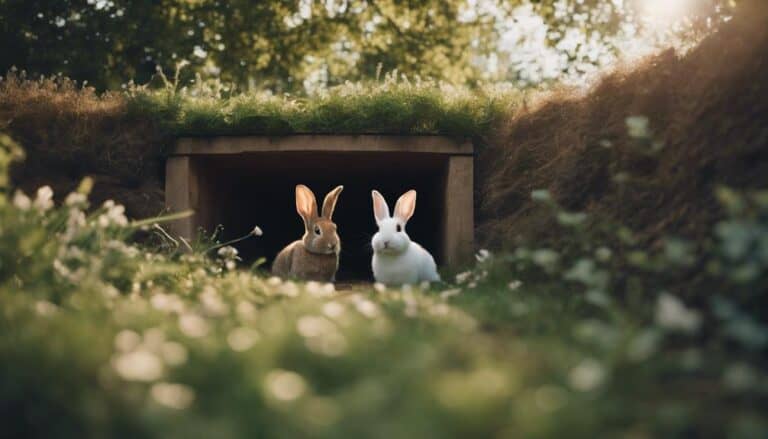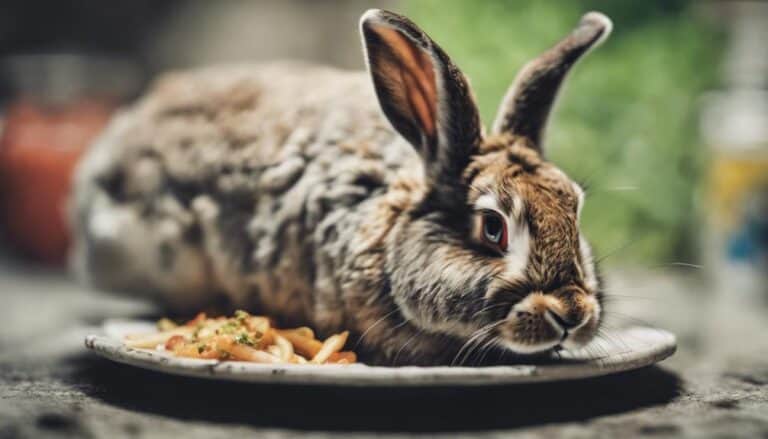You might think bunnies are immune to catching a cold, but that's not entirely true. Just like humans, these furry creatures can indeed come down with a cold, and the symptoms they exhibit might surprise you. From sneezing to runny noses, bunnies can show signs of a cold that warrant attention.
However, the interesting part lies in understanding how these symptoms present themselves in rabbits compared to humans. Stay tuned to discover more about the similarities and differences between bunny colds and those in humans.
Contents
Key Takeaways
- Bunny colds are common due to respiratory issues like viral or bacterial infections.
- Symptoms include runny nose, watery eyes, and sneezing.
- Prompt veterinary care and antibiotic therapy are crucial for treatment.
- Prevention involves hygiene, warmth, and monitoring for signs of illness in cold weather.
Bunny Cold Susceptibility
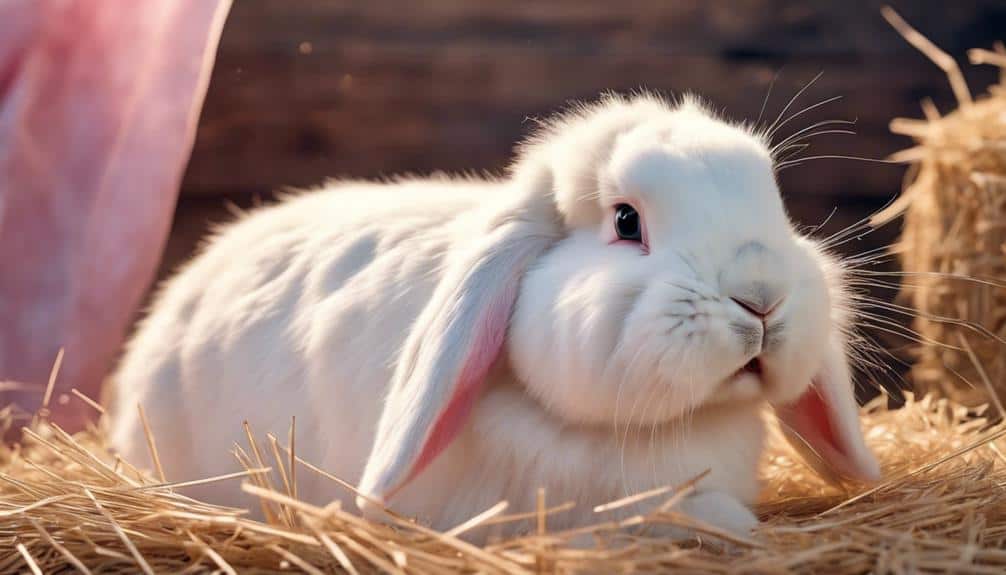
When it comes to bunny cold susceptibility, understanding the signs and potential causes is important for maintaining your rabbit's health and well-being. Respiratory issues are common in rabbits and can manifest as symptoms like a runny nose, watery eyes, and sneezing. While a viral upper respiratory infection, akin to a human cold, is a possibility, bacterial infections, especially Pasteurella multocida causing snuffles, can also present similarly.
It's important to mention that respiratory problems in rabbits can arise from various factors such as foreign bodies, irritants, allergies, dental issues, or underlying conditions like thymomas. Proper diagnosis through clinical examinations, imaging, and airway sampling is essential to differentiate between a simple cold and more severe respiratory conditions in rabbits.
Common Cold Symptoms in Bunnies
If your bunny is feeling under the weather, watch out for signs like a runny nose, watery eyes, and sneezing, which are common cold symptoms in bunnies. Reduced activity levels and appetite could also indicate that your bunny might've caught a cold.
Cold viruses may affect the upper respiratory system of bunnies, causing symptoms such as nasal discharge.
Cold Signs in Bunnies
Experiencing cold signs in bunnies, such as a runny nose or watery eyes, can be concerning and may indicate a need for veterinary attention. Cold symptoms in bunnies, often caused by respiratory viruses or bacterial infections, can lead to an upper respiratory infection.
Monitoring your bunny for changes in behavior, like decreased activity or appetite, is crucial for early detection. Seeking proper diagnosis and treatment for cold signs in bunnies is essential to prevent complications and guarantee your pet's well-being.
Treatment Options
To address common cold symptoms in bunnies, prompt veterinary care is crucial for accurate diagnosis and effective treatment. Bacterial infections, such as Pasteurella multocida, can lead to snuffles in rabbits, causing runny nose, watery eyes, and sneezing. Antibiotic therapy may be necessary to combat these infections and alleviate respiratory issues. Proper hygiene practices, such as keeping the bunny's living area clean and ensuring good ventilation, are essential.
Additionally, using warm compresses on the bunny's eyes or nose can provide some relief. Always seek guidance from a veterinarian to determine the best course of action for treating your bunny's cold symptoms and to prevent further complications.
Preventing Cold in Pet Rabbits
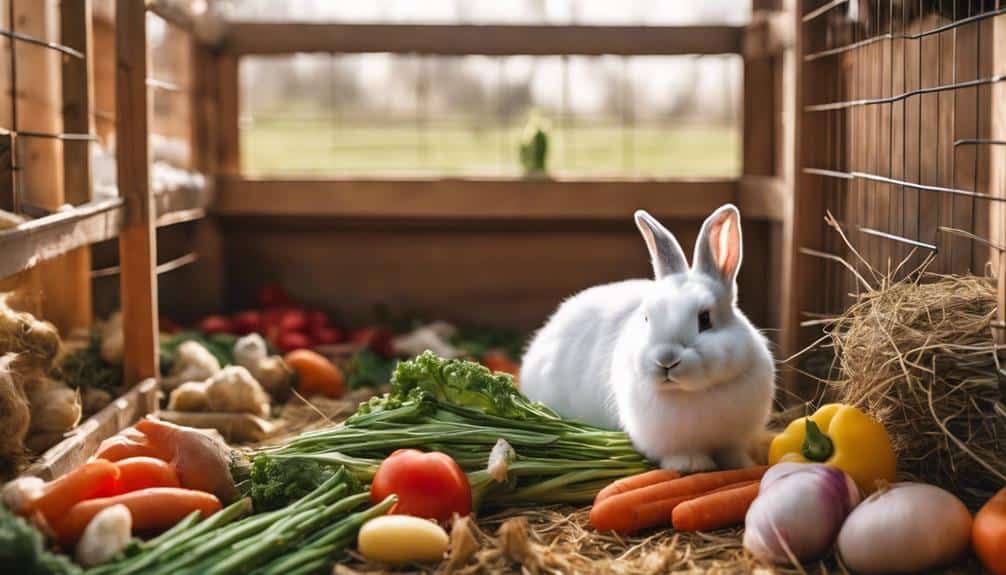
To prevent colds in your pet rabbits, take precautions in cold weather by ensuring they have adequate warmth and shelter.
Boost their immune system with a balanced diet rich in nutrients and vitamins that support overall health.
Regulate your rabbits' indoor environment to maintain proper ventilation and reduce the risk of exposure to viruses that can cause colds.
Cold Weather Precautions
In cold weather, making sure your pet rabbit has warm, draft-free housing is essential to prevent them from catching a cold. Cold temperatures can stress rabbits and weaken their immune system, increasing their susceptibility to respiratory infections. Providing extra bedding, hay, and a cozy shelter can help maintain their warmth and reduce the risk of cold-related illnesses.
For outdoor rabbits, it's important to shield them from wind, rain, and snow to prevent colds. Keep a close eye on your rabbits for any signs of illness such as lethargy, sneezing, or a runny nose during cold weather. Early detection can lead to prompt veterinary care, making sure your furry friend stays healthy and happy.
Dietary Immune System Boosters
Protect your pet rabbit from cold-related illnesses by incorporating dietary immune system boosters that can help prevent them from catching a cold. Fortify your rabbit's immune health with foods rich in vitamin C like bell peppers and parsley.
Provide essential vitamins and minerals by including leafy greens such as kale and spinach in their diet. Integrate herbs like basil and cilantro for antioxidants and antimicrobial properties.
Offer small amounts of fruits like strawberries and blueberries to contribute to your rabbit's overall immune health. Guarantee a balanced diet consisting of hay, fresh vegetables, and occasional fruits to support their immune system and prevent colds.
Indoor Environment Regulation
Maintaining a consistent indoor temperature between 60-70°F is important for preventing colds in pet rabbits. Proper ventilation in the living area is crucial to prevent humidity build-up, which can lead to respiratory issues. Avoiding sudden temperature fluctuations is key to keeping your rabbits comfortable and healthy. Providing adequate bedding and shelter helps them regulate their body temperature and stay warm. Regularly cleaning and disinfecting the living space is essential to reduce the risk of bacterial infections that can cause cold-like symptoms in rabbits.
| Indoor Environment Regulation |
|---|
| Key Points |
| Maintain 60-70°F temperature |
| Ensure proper ventilation |
| Prevent humidity build-up |
| Avoid temperature fluctuations |
Bunny Cold Care Tips
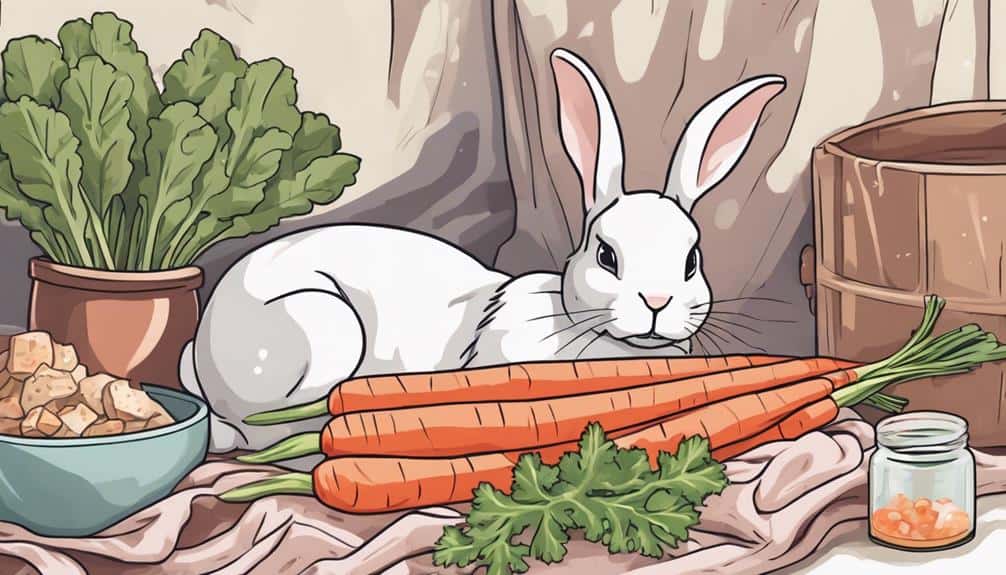
To help your bunny recover from a cold more quickly, create a warm and draft-free environment for them. Here are some essential care tips to assist your furry friend during this time:
- Guarantee a Cozy Habitat: Provide a warm and cozy living space with plenty of soft bedding.
- Hydration is Key: Encourage your bunny to drink water to stay hydrated and aid recovery.
- Gentle Cleaning: Keep your bunny's living area clean to prevent any further respiratory distress.
- Quiet Environment: Minimize loud noises and stressors to help your bunny rest and recuperate peacefully.
- Medical Attention: If your bunny's symptoms persist or worsen, seek veterinary care promptly for proper diagnosis and treatment.
Recognizing Cold in Rabbits
When observing your bunny for signs of a cold, watch out for symptoms such as a runny nose, watery eyes, and frequent sneezing. Cold in rabbits is a viral infection that affects the respiratory tract, potentially leading to more severe issues if not addressed promptly. Bacterial infections, particularly those caused by Pasteurella multocida, can exacerbate cold symptoms, resulting in conditions like snuffles.
Apart from infections, respiratory problems in rabbits can stem from various sources like dental problems, foreign objects, irritants such as dust or smoke, allergies, and even underlying cancers.
If you notice any of these symptoms in your rabbit, it's important to seek veterinary assessment and care. A veterinarian can accurately diagnose the cold or any potential respiratory infections, determine the underlying cause, and provide appropriate treatment to prevent complications. Early intervention is key to managing colds in rabbits effectively and ensuring their well-being. Remember, swift action and expert guidance are essential in maintaining your bunny's health when dealing with respiratory issues.
Bunny Cold Vs. Human Cold
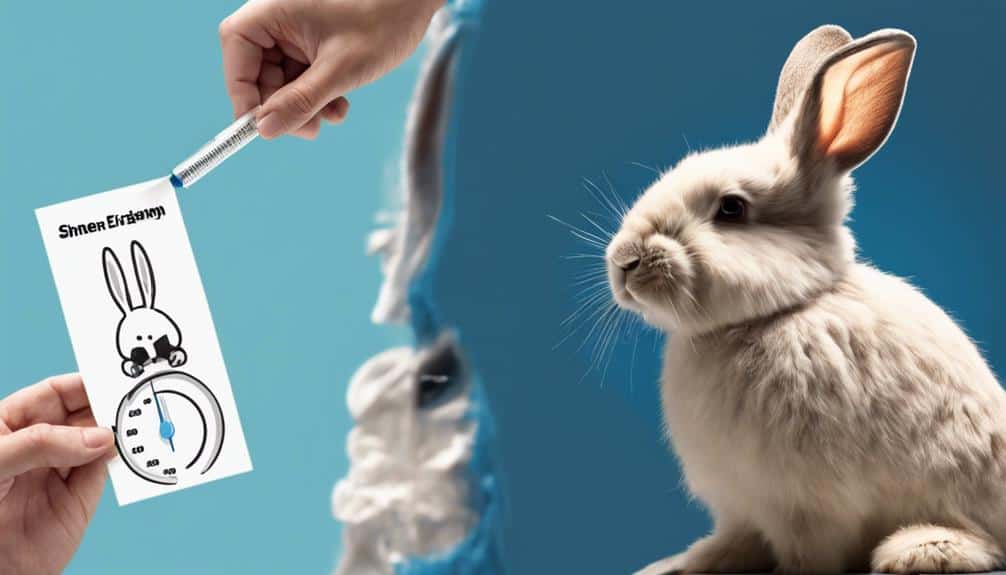
Understanding the distinction between a bunny cold and a human cold is important for providing proper care to your rabbit. Bunny colds are viral upper respiratory infections specific to rabbits, differing from human colds. Symptoms of a bunny cold include a runny nose, watery eyes, sneezing, and possible lethargy. It's important to emphasize that bunny colds aren't contagious to humans, and human cold viruses don't infect rabbits. To guarantee your rabbit's health, proper veterinary care is essential for diagnosing and treating bunny colds promptly to prevent complications. In addition, practicing good hygiene and maintaining a clean living environment can help prevent bunny colds in pet rabbits.
- Understanding the unique nature of bunny colds can aid in providing targeted care for your beloved pet.
- Recognizing the symptoms early on can help in seeking timely veterinary intervention for your rabbit.
- Remember, your rabbit's health and well-being depend on your proactive approach to addressing bunny colds.
- Implementing proper hygiene practices not only safeguards your rabbit but also fosters a healthy environment for them.
- Stay informed and vigilant about bunny colds to guarantee your rabbit leads a happy and healthy life.
Frequently Asked Questions
How Do You Know if Your Rabbit Has a Cold?
If your rabbit has a cold, watch for symptoms like a runny nose, watery eyes, sneezing, and lethargy. Seek veterinary care early for proper diagnosis and treatment. Provide warmth, proper care, and monitor closely to prevent complications.
Can a Bunny Catch Human Colds?
Bunny immunity differs from humans, making it unlikely for them to catch human colds. Prevent human transmission by good hygiene. Watch for bunny symptoms, seek prompt vet care, maintain proper care, and consider quarantine if needed.
What Happens if a Rabbit Gets Cold?
If your rabbit gets a cold, common symptoms like runny nose and sneezing may appear. Preventive measures include maintaining a warm indoor environment. Treatment options involve veterinary advice, care for rabbits, and addressing underlying issues.
Can Rabbit Snuffles Go Away on Its Own?
If left untreated, rabbit snuffles won't likely vanish on their own. Immediate veterinary attention is vital for proper treatment. Antibiotics, nebulizing, and isolation to prevent spread are typical measures. Your bunny's health depends on your quick action.
Conclusion
So, can bunnies catch a cold? Yes, they can. It's important to be vigilant about your rabbit's respiratory health and watch for symptoms like sneezing, watery eyes, and a runny nose.
By taking preventive measures, such as vaccination and regular veterinary check-ups, you can help keep your furry friend healthy and happy. Remember, a little care goes a long way in protecting your bunny from colds and other respiratory issues.

